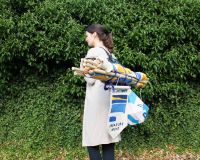Posted on Fri 15 Jul 2016
Joanna is a cat person
Reflections on my first week as a resident here

Posted by
In her talk on user experience delivered in the first week of my New Talent residency at The Watershed, Calvium's Jo Reid advised this: create a person, say what they do and decide what kind of stuff they like. As odd as it sounds, this notion of picturing my audience - or creating a persona for the kind of people that will be interacting with the work I make - has never really occurred to me in any major way before. I've always just hoped for the best, harboring a jauntily hopeful attitude of how local people might feel about an outsider coming into their town to round up the troops in the name of art.
I enjoy playing God as much as the next gal, so let’s dream up who these people might be for a second:
Joanna grew up in Scunthorpe all her life. She’s a mother of one very young son and works part time as a tattoo artist. She’s a cat person who hates public transport mainly because the bus stop outside her house doesn’t have a shelter so when it rains her hair - which takes ages to do - gets totally ruined. She hasn’t worked in the steel industry herself but her dad worked for TATA all of her childhood and so does one of her brothers. Recently her dad was laid off and is struggling to find work. He’s thought about moving elsewhere to find another job in steel, but Joanna hopes he doesn’t.
Christopher is a bit of a man of the people - locals call him ‘the sheriff’. Most people really appreciate Christopher because he goes out of his way to help. He mows the front lawn of all the people on his street for free. He picks up post for more than his fair share of neighbours. He steps up to read out eulogies when the original speakers fall apart at funerals. Some people find his do-gooder vibe a bit much. Plus he has excessively long nose hair which he refuses to acknowledge, and sometimes he will do well-meaning but totally inappropriate things like buy someone a new doormat to replace their old drab one then switch them over without asking - even though they liked their old drab doormat just fine. Community is super important to Christopher - he believes that people should be connected and that everyone should make an effort to have each others back. He’ll give anything the time of the day, but he wants to know that the part he plays is genuinely useful and worthwhile.
Lord knows what Dorine’s deal is. She’s had a chip shop on her shoulder since the beginning of time. She pays for everything in coppers and has a hand written ‘no carol singers’ sign on her door all year round. She hates it when people try to engage in small talk on the bus to work, but she gets a lot from her job when she gets there. She's been a steelworker for 7 years, it's the best pay she's ever had and she's good at it. She would hate to see the industry disappear.
My mentor and the cracking Creative Producer & Director Katherine Jewkes has been involved in her fair share of projects involving local communities and participatory arts - or as Mandy Rose from the digital cultures research centre put it in a talk this week “co-creation”. Katherine’s advice is that, when making work about a place, it should always start with love. If an area is going through any kind of bad luck, it shouldn’t be those problems that you focus on first. Scunthorpe has been unsearchable on the internet numerous times for having an obscene word between letters S and H, and more recently has gone through a hell of a lot of uncertainty and devastating job loss due to the fading of its core steel industry - but that’s not what I want to be going for first. The area’s cultural heritage is being threatened, but the very reason why this threat matters is precisely because of the Joannas, Christophers and Dorines who in their own diverse ways bring love to the town they live in.
Regardless of how much of a rough time a place has had, it’s also had romances, winning bets and best mates. At least my imaginary residents have had some of those things - even bloody Dorine. The main thing on my mind after week one is this: how do you bring in an obscure, artsy type project and make it accessible to everyday people? Joanna is a creative herself, and has some links with the steel industry. Christopher is a community man who likes to play a clear role in his town. Dorine doesn't like a lot, but she loves the steel industry more than anything. Now to design something that can engage all of them, and everyone else.
